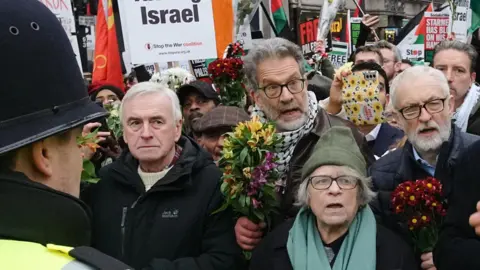In a recent political development in the United Kingdom, Members of Parliament Jeremy Corbyn and John McDonnell have been cleared of any charges following their participation in a pro-Palestinian rally that took place in January 2025. This decision comes after both MPs were interviewed by the police regarding their involvement in the demonstration, which had drawn significant attention and criticism at the time.
John McDonnell articulated that they were questioned by law enforcement officials about allegations that they had not adhered to police regulations during the protest. According to McDonnell, these allegations were unfounded, asserting that both he and Corbyn complied with police directives throughout the event. In a plea for accountability, McDonnell expressed concern over the treatment they received, specifically targeting the Metropolitan Police for what he felt was an unfair targeting of the two of them, solely based on their status as members of Parliament.
The rally, attended by several thousand demonstrators in London’s Whitehall, was a response to the police’s barring of plans to hold a march originating from Portland Place, which is close to the BBC headquarters. The police had instituted restrictions on the protest, citing the prospective congregation of individuals near a synagogue, suggesting it might lead to significant upheaval as worshippers attended services. These restrictions dictated that the demonstration be limited to Whitehall, a condition that sparked controversy among protestors who felt it infringed upon their rights to assemble and voice their opinions.
In a follow-up statement delivered in the House of Commons, McDonnell confirmed that the investigation against them had been dropped and no charges would be pursued. He remarked that the Metropolitan Police had previously suggested, through communications with their solicitor, that their cases were sent to the Crown Prosecution Service under the notion of possessing “greater culpability” due to their positions as MPs. McDonnell condemned this notion as an unacceptable practice that contradicts the vital legal principle that all individuals should be treated equally under the law.
Jeremy Corbyn echoed similar sentiments, arguing that the police’s focus on him and McDonnell was a deliberate attempt to suppress the democratic rights of citizens, painting their situation as part of a larger pattern of intimidation against those in the political arena. It’s worth noting that Corbyn was re-elected as an independent MP for Islington North after losing the Labour whip back in 2020, reflecting the ongoing changes within his political standing.
As for John McDonnell, he currently represents Hayes and Harlington as an independent after being suspended from Labour in July 2024 due to his vote against government policy regarding child benefits. Their roles as independents mark a significant shift in their political trajectories following earlier affiliations with the Labour Party.
In conjunction with the dismissal of charges against themselves, both Corbyn and McDonnell have also called for similar leniency towards Christopher Nineham and Benjamin Jamal, who face trial next month related to public order charges stemming from the same protest. Meanwhile, a spokesperson for the Metropolitan Police confirmed that after reviewing the evidence, no further action would be taken against the nine individuals previously interviewed as part of the investigation.
Additionally, this spokesperson clarified that two individuals had been charged with violations of the Public Order Act during the protest, with trials set to commence next month, while two others remain under investigation. Meanwhile, a representative from the Crown Prosecution Service reported that they decided not to bring charges against two individuals aged 76 and 73, as there was insufficient evidence to support a realistic prospect of conviction.
In summary, Jeremy Corbyn and John McDonnell’s clearance of charges signals a temporary relief amidst the charged atmosphere surrounding protests in the UK, especially regarding issues of public assembly and expression. Their experience echoes broader discussions about the balance of authority and rights within democratic frameworks, emphasizing the ongoing struggles faced by public figures and activists alike in the current political landscape.



